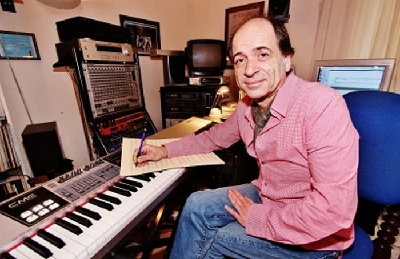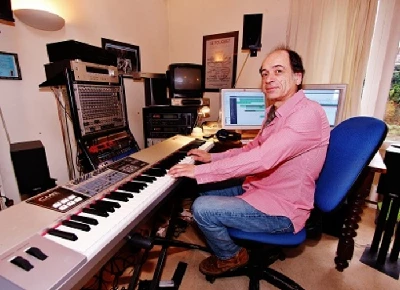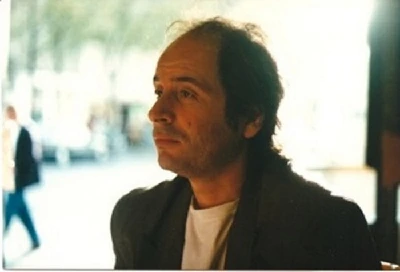published: 6 /
12 /
2012

Nick Robinson speaks to composer Guy Dagul about his unusual childhood, the son of two classical musicians, and his career as both a much-acclaimed pianist and writing soundtracks for Hollywood films and television
Article
Guy Dagul is not a household name. But many celebrated musicians and quite a few film and TV producers believe he deserves to be. A classically trained pianist, viola player, composer and producer, Guy, now 55, has played piano in every leading UK concert hall. He has performed on stage with Alan Bates, Zoe Wanamaker, Robert Hardy plus many more. And he has created countless hours of music for TV and for films like ‘Mississippi Burning’, ‘Arachnophobia’, ‘Sea of Love’, ‘Last of the Mohicans’, ‘Cliffhanger’, ‘Greenfingers’ and ‘In The Name of the Father’. Guy's talent for jazz and improvisation has led to him becoming one of the most popular composers of musical scores for film and television. In fact Guy's soundtracks have been the backdrop to many of our lives these past two decades.
Yet, while Guy is passionate about his music, he has never sought a high personal profile. When we meet at Guy's studio in the lovely garden of his Oxfordshire village home, it is quickly apparent that the current cult of celebrity is something he doesn't readily connect with. Guy casually mentions that Helen Mirren and Jeremy Irons have recorded in his studio but he is refreshingly matter of fact about it. Perhaps this is because Guy was raised with rather different values from the average London boy in the 1960s? Guy's parents –Isabel Beyer and Harvey Dagul – were, indeed still are, classical pianists who have toured the world delighting audiences with their piano duet playing.What was Guy's childhood like with these two highly accomplished musicians as parents?
“My very early childhood was in a modest house in Southgate, North London. I was a twin and my first recollections are spending time crawling under the Bechstein grand piano which filled the small front room. My parents had a strong work ethic and music –whether teaching or playing – was very important. They would be playing piano all the time. My twin brother and I would be there watching our mother's feet going up and down on the pedals, then we'd be looking up at the strings above. Until I met other children I actually thought all infants lived under a grand piano. It was a bit of a shock to find they didn't!”
“I still recall the tunes my parents played. It was virtually all classical. My parents were very strict about that. So I was raised on a strict diet of live classical music – and I was totally sheltered from pop culture, jazz, blues...those things just didn't exist for me. So, yes, it was different and I was encouraged to view many things away from classical music as very superficial. This hasn't always helped when trying to socialise and live a 'normal' life in subsequent years. Though later, after my parents were able to move to a bigger home in St Albans, Hertfordshire, I was fortunate in attending Francis Bacon Grammar School. There was a big emphasis on music there and the music tuition was excellent. By the age of sixteen I'd achieved a high standard on both the piano and the viola. I was a soloist singing Gilbert and Sullivan and was the school's star pianist so I performed a lot.”
“But my teenage years were difficult. Just before we were thirteen, my twin brother was killed in a road accident. It all happened so suddenly, just before Christmas. Until that moment I was half of a pair of twins and then suddenly I was alone. My parents struggled to cope and there was no counselling back then. They and I were just left to get on with it. After that trauma I was kind of sleep-walking through life for several years. Apart from my musical achievements which came easily to me, my teens were a foggy mess. I could easily have gone off the rails completely. But I was saved by seeing the film ‘A Clockwork Orange’ by Stanley Kubrick who lived nearby and was a local hero. I loved the soundtrack – but I was so horrified by the teenage thugs in the film that, suddenly, I knew I didn't want to end up a delinquent. From then on I started to apply myself at school.”
Guy went to Manchester University where he took a course run jointly with the Royal Northern College of Music. He ended up with two music degrees. Throughout his five years in Manchester he was constantly performing as a concert pianist. He recorded and appeared regularly with his parents – sometimes playing six hands on one piano.
“That was a novelty thing, really. Horribly uncomfortable to do – I'd be squashed in the middle between them. It's all about the choreography....it is gymnastics with the hands at the piano, a circus act. But I suppose the music did have some integrity and there is classical music specially written for six hands – you'd be surprised. We were on BBC TV's ‘Pebble Mill at One’ because it was such a weird sight!”
Guy also played solo, worked as an accompanist with the London Elizabethan Singers and he performed with the Decchler Piano Trio. He was involved in live broadcasts, made various recordings and appeared in all the top British concert halls. But increasingly Guy felt solo performance wasn't for him.
“It started to seem a very exposed thing to do. As a pianist you have to walk on to the stage, you see a piano you've never seen in your life before and you have to play it perfectly. Suddenly this life started to seem alien and very lonely.” And I got the urge to improvise rather than just reading the same dots, performing to big audiences of strangers. I started to play a bit of jazz and loved improvising. I could also sight-read music really well – which I enjoyed – rather than just practising the same piece of music over and over. Quickly I found I was in demand as a session musician, playing all kinds of things. And soon after that I started to work with two film composers, George Fenton and Trevor Jones. In their world improvisation was everything – and that really suited me. So I began to learn the trade from them. By now I understood more about the linkages between musicians – and the possibility of fusion, so popular today, between classical, jazz and other musical genres. One of the Decchler Trio, the violinist Nicholas Parker, was a great recording engineer and he worked with George Fenton. And the cellist, Caroline Verney – who became my wife and the mother of my three children – used to accompany the pop group Madness and toured the world with them. Anyway, I applied myself to my role working with George Fenton and Trevor Jones and became immersed in the world of film music.”
“Not long after I moved out to Oxfordshire, Trevor Jones asked me to join him to work on a film project in Los Angeles. It was too good an opportunity to miss but I kept the Oxfordshire house – and I've enjoyed creating my own garden here.”
Were there any surprises, working in Hollywood in the film industry?
“We lived in luxurious houses – in Beverly Hills, Bel Air, Mailbu Heights and people treated me well. But I was shocked at the absolute lack of culture there and I felt Los Angeles was spiritually dead and very shallow. I loved the sunshine and the work was fine. I was there on and off for four years but, although it was a brilliant career experience, I couldn't wait to get back to Britain. I did learn a lot, though. The secret of a great film score is that you don't notice it at the time – yet you leave the cinema singing the theme tune. It should never get in the way.”
“Some of the directors were fascinating too – though they could be incredibly demanding. Sometimes late cuts to a film can play havoc with the music soundtrack – which all has to be re-jigged, with full orchestras on stand-by while you are desperately reworking the score to fit the director's latest edit. A mathematical brain is important – and you need to work at huge speed. ‘Cliffhanger’, directed by Renny Harlin, was one of the biggest professional challenges for Trevor Jones and me! I enjoyed working on ‘Blame It On The Bellboy’ directed by Mark Herman and starring Dudley Moore who was a huge hero of mine. Dudley was a wonderful musician and he had wanted to write the film music. It was quite poignant because Dudley was developing Parkinson's Disease then – but it hadn't been diagnosed. Sometimes the symptoms could make him seem a little drunk – which he wasn't. And this was probably a factor in him not being hired to write the musical score. The film score was real orchestration from beginning to end – Vivaldi, pastiche Vivaldi – and I was able to really come into my own, arranging, segueing and fusing a full orchestra with a synthesizer.”
“One of the people whose work I've most admired is Danny Elfman who I'd happily swap places with. Danny has written beautifully constructed and brilliantly orchestrated music for a truly great director – Tim Burton. And I also really rate Ennio Morricone who wrote ‘The Good, the Bad and the Ugly’ music – in my view the best soundtrack of all time. He was so brave with the sounds. It is the most unpolished soundtrack album but it is wonderful, pure genius.”
Over the last twenty years Guy has been responsible for many memorable music scores. The music for BBC TV's ‘Eyewitness’ natural history series was a major project undertaken in Guy's studio. Plus Guy has provided soundtracks for various Japanese TV and film productions, for Delia Smith's cookery programmes, for National Geographic and the Discovery channel as well as for ‘Greenfingers’, starring Helen Mirren and Clive Owen. He has also worked with a talented local singer/songwriter called Rebecca Poole and with 'Legs' Larry Smith (ex-Bonzo Dog Doo-Dah Band). And for the last 3 years Guy has been developing and helping produce/manage three young Iranian opera singers who want to become pop stars. They are called Le Tre Orfei (the three daughters of Orpheus) and are based in Vienna.
“This is another example of classical crossover. A bit of Albinoni's Adagio – as it is known – comes out and, though I know I am cheapening it a bit, I do still try to keep the musical integrity as high as I can. Mind you, we took the girls to a TV talent show in Germany last weekend – the equivalent of ‘Britain's Got Talent’– only to find they were beaten by a parrot. I do despair! But I am determined not to lower my standards!”
Does Guy have advice for young musicians?
“If I had a magic wand I would like to educate the world by introducing them to the most beautiful music – but in palatable chunks. At one time I worked in Tower Hamlets introducing disadvantaged children to music. And that was hugely rewarding. The main advice, though, would be to just do the music you want to do and give yourself time. You don't actually need much money. But you do need time and patience. Parents' support is important too. So many people have let parents wipe out their artistic ambitions to the point where in middle age they have forgotten what they once wanted to be and probably could have been. All my three children are musical in different ways which I am very happy about. My daughter Rose writes extraordinary minimalistic music and as Rhosyn she is a budding pop star who plays cello and sings. She has performed at Glastonbury and it is wacky, weird, brave and beautiful.....very unconventional! One of my sons, Bill, is an eclectic hip-hop DJ performing under the name of Bagul. My other son, Sam, spends his time behind the bar at The Magdalen Arms in Oxford, singing and humming!”
How does Guy relax?
“I garden. And I have written two children's operas. And I was thrilled to hear the first rehearsal of my children's opera. We also did a musical at the local primary school here in my village where I was very involved a few years ago. And seeing them – including my own children – perform my music was probably one of my best ever moments.”
“I also play keyboards locally with several bands. One is called Lucky To Be Alive and it has become one of the most sought after function bands in the South of England. They are all incredibly capable musicians and there's a big repertoire of rock, jazz and blues numbers. We've played at all kinds of prestigious corporate events and at the Dorchester Hotel, Highclere Castle, The Hard Rock Café and Chelsea Football Ground. But probably many people would say our biggest claim to fame was playing at the wedding of Peter Andre and Katie Price! Which is a long way from spending my early days under my parents' grand piano, immersed in classical music although that was over fifty years ago!”
Picture Gallery:-

